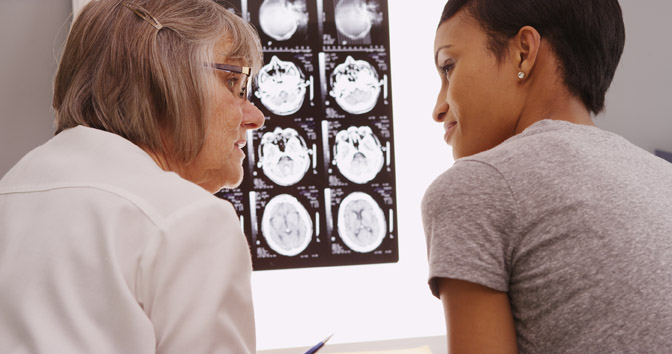Defining Traumatic Brain Injuries and Concussions
Often there is a misconception as to the definition of a traumatic brain injury. Many people believe that these types of injuries present themselves with immediate and recognizable results such as a coma or profound physical disability. However, in many instances, this is not the case. Complications resulting from traumatic brain injuries / concussions such as memory loss, confusion, and other cognitive issues are often not readily apparent. What type of accidents generally causes the most traumatic brain injuries / concussions? Government statistics indicate that falls and motor vehicle accidents account for the highest number of traumatic brain injuries / concussions in the United States.
A traumatic brain injury is generally defined as a blow or jolt to the head which causes a disruption in brain function. Traumatic brain injuries caused by an accident can result in a wide array of functional changes that affect problem solving, speech, concentration, memory loss and behavior. Many of these problems develop over time and can cause great emotional stress not only for the person who is injured but the person’s immediate family as well. In our own practice, we have many clients who have longstanding complications from traumatic brain injuries / concussions. The frustration that results from a traumatic brain injury can be life-altering. Often individuals experience problems that they never encountered before. What can be particularly bothersome is that there is no single objective measure to determine if someone had a traumatic brain injury such as a concussion. Symptoms such as forgetfulness, confusion, mental errors, dizziness and the like are all subjective. At times, it is very difficult to objectively prove ongoing disability from such an injury.
Recovering from traumatic brain injuries or concussions
The key to recovery from traumatic brain injuries / concussions is prompt medical attention and treatment. The sooner someone is diagnosed the better the chances are for recovery. It is important to remember that if you have an accident such as a fall or blow to the head, it is vitally important that the problem is followed by a medical professional as soon as reasonably possible. From a legal standpoint, proving disability or complications from traumatic brain injuries and concussions can be problematic.
Legally there are 3 components to proving disability from a traumatic brain injury and/or concussion. The first is proving the occurrence of an injury. While this may seem like a rather simple process, in some cases an injury may not be so obvious. A long time ago we handled a case where in the client was involved in what appeared to be a minor traffic accident. The vehicle was struck from behind and by all measures the client did not appear to have suffered any type of injury. No visible marks or other indications of injury. A couple of days after this incident she began to experience a lack of concentration, memory loss, confusion and an inability to problem solve. After further investigation we were able to discover that while she did not visibly strike her head in this accident she did suffer a severe jolt to her head.
After establishing that an injury did indeed occur the second issue we faced was having to prove that the cognitive difficulties that she was having (i.e. lack of concentration, confusion, memory loss and inability to problem solve) were indeed the result of this injury. To do this the third component was necessary which was medical evidence to establish the connection.
By having our client seen by medical experts who were familiar with the residuals of traumatic brain injuries we were able to establish not only that the problems that she was suffering from came from the accident in question but that she was medically disabled from these problems. Proving this enabled us to secure a monetary award for her so that she was able to have adequate funds from which to move on once her disability ended.
An attorney experienced in handling traumatic brain injury / concussions can readily identify the residuals of a traumatic brain injury and obtain the best possible evidence to support the disability that may result from such an injury. Proving an injury, establishing that there are cognitive problems and obtaining the medical necessary to prove that the cognitive problems were from the injury are the steps necessary to succeed in winning a traumatic brain injury / concussion case.

